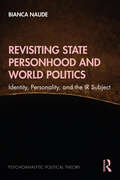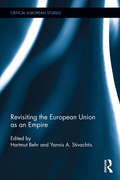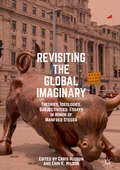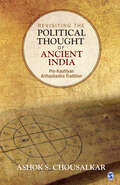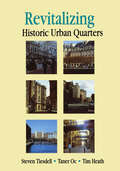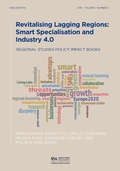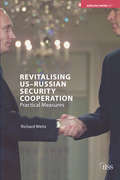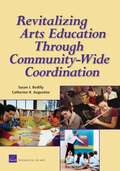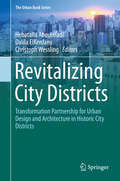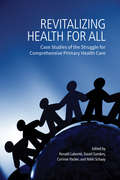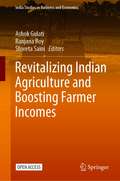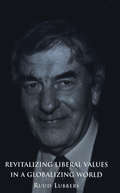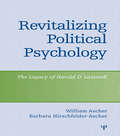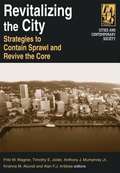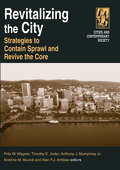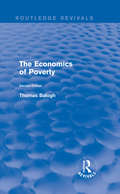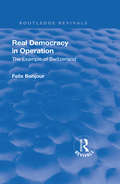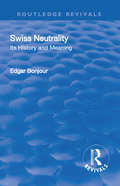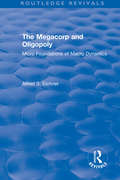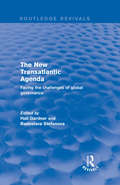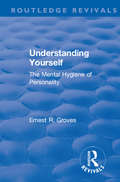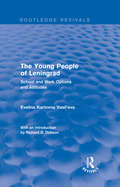- Table View
- List View
Revisiting State Personhood and World Politics: Identity, Personality and the IR Subject (Psychoanalytic Political Theory)
by Bianca NaudeBreathing fresh air into debates surrounding foreign policy and interstate relations, Bianca Naude presents a holistic theory of states as collectives of people that cannot be reduced to their individual constituents. Moving among current research on the ontological status of the state alongside important arguments in support of the state personhood thesis, Naude begins by exploring Freud’s personality theory and the ways in which this theory has evolved over time in response to newer insights from the field of experimental psychology. Recognizing that Freud’s work is in many ways outdated, she considers more recent literature on narcissism as an aspect of self-esteem rather than a form of psychopathology, drawing specifically on Kohut’s expansion of the concept of narcissism as a normal feature of personality development. Using the South African state as a case study, Naude demonstrates the various ways in which the state presents itself to the outside world on the one hand, and how it wishes to see itself on the other. She further considers how narcissistic defenses help protect the state's ego from criticism and self-judgments. Revisiting State Personhood and World Politics will help readers understand how the state sees itself, why or when the state experiences shame, humiliation, guilt or pride, and how it responds to these self-conscious emotions. It will be a valuable resource to researchers and students of International Relations.
Revisiting the Department of Defense SBIR Fast Track Initiative
by National Research Council of the National AcademiesIn October 1995, the Department of Defense launched a Fast Track initiative to attract new firms and encourage commercialization of Small Business Innovation Research (SBIR) funded technologies throughout the department. The goal of the Fast Track initiative is to help close the funding gap that can occur between Phase I and II of the SBIR program. The Fast Track initiative seeks to address the gap by providing expedited review and essentially continuous funding from Phase I to Phase II, as long as applying firms can demonstrate that they have obtained third-party financing for their technology. Another program initiative, Phase II Enhancement, was launched in 1999 to concentrate SBIR funds on those R&D projects most likely to result in viable new products that the Department of Defense and others will buy. The current volume evaluates the two SBIR Program initiatives--Fast Track and Phase II Enhancement--and finds that both programs are effective. Ninety percent of Fast Track and 95 percent of Phase II Enhancement reported satisfaction with their decision. This book identifies the successes and remaining shortcomings of the programs, providing recommendations to address these issues.
Revisiting the European Union as Empire (Critical European Studies #4)
by Hartmut Behr Yannis A. StivachtisThe European Union’s stalled expansion, the Euro deficit and emerging crises of economic and political sovereignty in Greece, Italy and Spain have significantly altered the image of the EU as a model of progressive civilization. However, despite recent events the EU maintains its international image as the paragon of European politics and global governance. This book unites leading scholars on Europe and Empire to revisit the view of the European Union as an ‘imperial’ power. It offers a re-appraisal of the EU as empire in response to geopolitical and economic developments since 2007 and asks if the policies, practices, and priorities of the Union exhibit characteristics of a modern empire. This text will be of key interest to students and scholars of the EU, European studies, history, sociology, international relations, and economics.
Revisiting the Global Imaginary: Theories, Ideologies, Subjectivities: Essays in Honor of Manfred Steger
by Chris Hudson Erin K. WilsonManfred B. Steger’s extensive body of work on globalization has made him one of the most influential scholars working in the field of global studies today. His conceptualization of the global imaginary is amongst the most significant developments in thinking about globalization of the last three decades. Revisiting the Global Imaginary pays tribute to Steger’s contribution to our intellectual history with essays on the evolution, ontological foundations and methodological approaches to the study of the global imaginary. The transdisciplinary framework of this field of enquiry lends itself to investigation in diverse sites. This volume of essays explores practices associated with the reproduction of the global imaginary in such diverse sites as mobile money, Irish pubs, cyber-capitalism, urban space, music in post-apartheid South Africa and global political movements, amongst others.
Revisiting the Origins of Human Rights
by Slotte, Pamela and Halme-Tuomisaari, Miia Pamela Slotte Miia Halme-TuomisaariDid the history of human rights begin decades, centuries or even millennia ago? What constitutes this history? And what can we really learn from 'the textbook narrative' - the unilinear, forward-looking tale of progress and inevitable triumph authored primarily by Western philosophers, politicians and activists? Does such a distinguishable entity as 'the history of human rights' even exist, or are efforts to read evidence in past events of the later 'evolution' of human rights mere ideology? This book explores these questions through a collective effort by scholars of history, law, theology and anthropology. Rather than entities with an absolute, predefined 'essence', this book conceptualizes human rights as open-ended and ambiguous. It taps into recent 'revisionist' debates and asks: what do we really know of the history of human rights?
Revisiting the Political Thought of Ancient India: Pre-Kautilyan Arthashastra Tradition
by Ashok S. ChousalkarRevisiting the Political Thought of Ancient India: Pre-Kautilyan Arthashastra Tradition rediscovers the political ideas of the original and celebrated schools of thought in ancient India—early Arthashastra and Pre-Kautilyan traditions. This book throws light on hitherto not very well-known aspects of political ideas in ancient India, which flourished during the 5th and 4th centuries before Christ. Kautilya’s Arthashastra is a major text on ancient Indian political thought, wherein he cited views of a number of Arthashastra teachers who had written on political science. Unfortunately, their writings are not available today; only their views are found scattered in different texts. This book brings together these views to prepare a coherent account of their political ideas and reconstructs the pre-Kautilyan Arthashastra tradition with the help of available sources.
Revitalising Historic Urban Quarters
by Steve Tiesdell Tim Heath Taner OcThis book synthesizes urban design and urban regeneration by examining the revitalization of a number of historic urban quarters. Its focus is on quarters or areas where there is a significant number of historic buildings concentrated in a small area; with places and area-based approaches. Many cities have such quarters that confer on them a sense of place and identity through their historic continuity and cultural associations. The quarters are often an integral element of the city's image and identity. The lessons and observations from the experience of the revitalization of such historic urban quarters forms the core ofthis book with a number of case study examples from North America and Europe showing a variety of approaches to and outcomes of revitalization.
Revitalising Lagging Regions: Smart Specialisation and Industry 4.0 (Regional Studies Policy Impact Books)
This Expo book brings together leading academic and policymaker experts to reflect on the significant challenges faced by lagging regions in participating in the European Union’s Research and Innovation Strategies for Smart Specialisation (RIS3) programme. In doing so, the book offers a set of new policy recommendations on the design and implementation of appropriate Smart Specialisation Strategies (S3) in lagging regions, which may enable them to benefit from the opportunities of digitalisation and Industry 4.0 (I4.0).
Revitalising US-Russian Security Cooperation: Practical Measures (Adelphi series #377)
by Richard WeitzRussia and the United States are the most important countries for many vital security issues. They possess the world’s largest nuclear weapons arsenals, are involved in the principal regional conflicts, and have lead roles in opposing international terrorism and weapons proliferation. Despite persistent differences on many questions, mutual interests consistently drive Russians and Americans to work together to overcome these impediments. This Adelphi paper argues that opportunities for improving further security cooperation between Russia and the United States exist but are limited. Near-term results in the areas of formal arms control or ballistic missile defences are unlikely. The two governments should focus on improving and expanding their joint threat reduction and nonproliferation programmes, enhancing their military-to-military dialogue regarding Central Asia and defence industrial cooperation, and deepening their antiterrorist cooperation, both bilaterally and through NATO. Using more market incentives, expanding reciprocity and equal treatment, and limiting the adverse repercussions from disputes over Iran would facilitate progress. Russia and the United States will not soon become close allies, but they should be able to achieve better security ties given that, on most issues, their shared interests outweigh those that divide them.
Revitalizing Arts Education Through Community-Wide Coordination
by Susan J. Bodilly Laura Zakaras Catherine H. AugustineInitiatives to coordinate schools, cultural institutions, community-based organizations, foundations, and/or government agencies to promote access to arts education in and outside of schools have recently developed. This study looks at the collaboration efforts of six urban communities: how they started and evolved, the kinds of organizations involved, conditions that helped and that hindered coordination, and strategies used.
Revitalizing City Districts
by Hebatalla Abouelfadl Dalila Elkerdany Christoph WesslingThis book explores the consequences of change in the urban form, the amalgam of the urban space and buildings and on the processes leading to planning and design. Urban form and its fabric result from a multitude of individual interests, ideas and decisions which in turn result in specific and locally diverse spatial arrangements. These processes which are shaping our built environment are embedded in and determined by different contexts of political, cultural and social-economic norms and values. Urban development and the transformation of urban structures are triggered by technological innovations, laws and taxes, new behaviors or the impact of environmental conditions as well as other factors. Based on case studies from Egypt and the Middle East, together with some cases from Germany and Turkey, this book covers a wide range of change processes focused on historic and inner city districts.
Revitalizing Health for All: Case Studies of the Struggle for Comprehensive Primary Health Care
by Corinne Packer David Sanders International Development Research Centr Nikki Schaay Ronald LabontéThe concept of Comprehensive Primary Health Care focuses on health system efforts to improve equity in health care access, community empowerment, participation of marginalized groups, and actions on the social determinants of health. Despite its existence since the late 1970s very few studies have been able to highlight the outcomes of this concept, until now. Revitalizing Health for All examines thirteen cases of efforts to implement CPHC reforms from around the globe including Australia, Brazil, Democratic Republic of Congo, Iran, South Africa, and more. The findings presented in this volume originate from an international action-research set of studies that utilized triads of senior and junior researchers and knowledge users from each country’s public health system. Primary health care reform is an important policy discourse both at the national level in these countries and in the global conversations, and this volume reveals the similarities among CPHC projects in diverse national contexts. These similarities provide a rich evidence base from which future CPHC reform initiatives can draw, regardless of their country.
Revitalizing Indian Agriculture and Boosting Farmer Incomes (India Studies in Business and Economics)
by Ashok Gulati Ranjana Roy Shweta SainiThis open access book provides an evidence-based roadmap for revitalising Indian agriculture while ensuring that the growth process is efficient, inclusive, and sustainable, and results in sustained growth of farmers’ incomes. The book, instead of looking for global best practices and evaluating them to assess the possibility of replicating these domestically, looks inward at the best practices and experiences within Indian states, to answer questions such as -- how the agricultural growth process can be speeded up and made more inclusive, and financially viable; are there any best practices that can be studied and replicated to bring about faster growth in agriculture; does the prior hypothesis that rapid agricultural growth can alleviate poverty faster, reduce malnutrition, and augment farmers’ incomes stand? To answer these questions, the book follows four broad threads -- i) Linkage between agricultural performance, poverty and malnutrition; ii) Analysing the historical growth performance of agricultural sector in selected Indian states; iii) Will higher agricultural GDP necessarily result in higher incomes for farmers; iv) Analysing the current agricultural policy environment to evaluate its efficiency and efficacy, and consolidate all analysis to create a roadmap. These are discussed in 12 chapters, which provide a building block for the concluding chapter that presents a roadmap for revitalising Indian agriculture while ensuring growth in farmers’ incomes.
Revitalizing Liberal Values in a Globali
by Ruud LubbersThe longest serving Dutch Prime Minister (1982-94), Professor Lubbers is known for his support of liberal values, social equity, human rights, democratic governments, and spirituality. In this book he explores ways to conciliate these values with global economization.Dr. Lubbers argues that the global economy created by new information technologies has led to a competitive world atmosphere that works against social equity, local movements, and national interests. In this context he urges that steps be taken to ensure that the new era evolves in the interests of justice, peace, and fairness. Such steps may include combining the governance of nation states; providing development assistance; supporting initiatives in legislation and jurisprudence, such as an international criminal court, and initiating a global dialogue on values. For Dr. Lubbers, liberal values mean a "just, sustainable, and participatory society."This volume presents the third in a series of lectures that offer reflections by well-known figures on topical, liberal-oriented themes. This particular lecture has the distinction of never having been delivered, since Toronto was in the midst of a crippling snowstorm on the afternoon of 14 January 1999, when Lubbers was scheduled to speak at Victoria University. The two earlier volumes in the series present lectures by John Kenneth Galbraith and Michael Ignatieff.
Revitalizing Political Psychology: The Legacy of Harold D. Lasswell
by William Ascher Barbara Hirschfelder-AscherThe goal of this book is to recapture the diminished roles of affect, psychological needs, and the psychodynamic mechanisms that are crucial for understanding political behavior by explaining and extending the contributions of Harold D. Lasswell, the dominant figure in political psychology in the mid-twentieth-century. Although Lasswell was best known for applying psychodynamic theories to politics, this book also demonstrates how his framework accommodated for cognitive processes and social interactions ranging from communications to policy-making. The authors use Lasswell's contributions and the debates over his ideas as a springboard for examining current policy, political, and leadership issues.Revitalizing Political Psychology presents and extends four aspects of Lasswell's contributions to the field: the psychodynamic mechanisms drawn from psychoanalytic theory, the use of symbol associations to understand political propaganda, the analysis of "democratic character" for both the public and the elites, and the structure of belief systems. In so doing, the authors link personality and political communication theory to democratic practice. The authors also critique leadership studies using Lasswell's concerns over the risks to democratic accountability and the current preoccupation with strengthening the roles of charismatic and transformational leaders.Intended for researchers, practitioners, and students in the areas of political and historical psychology, political strategy, and political communication, the book's emphasis on psychodynamics also appeals to psychoanalysts and the material on leadership appeals to professionals in management and industrial/organizational psychology.
Revitalizing the City: Strategies to Contain Sprawl and Revive the Core
by Fritz W. Wagner Timothy E. Joder Alan F. J. Artibise Krishna M. Akundi Anthony J. Mumphrey Jr.In this unique collaboration between Canadian and US researchers, contributors of 13 articles describe their work in such issues as urban sprawl, metropolitan governance, central city revitalization, and city-suburb cooperation. The articles define key issues, describe their research and experience in local initiatives, identify effective policies and programs, and also warn of potential pitfalls. Articles on urban growth include studies on suburban expansion and metropolitan development, the need to contain growth, and the experience of San Diego. Those on metropolitan administration include case studies of Vancouver and St. Louis and a preliminary assessment of regional "smart growth. " Those on redevelopment include a study of the impact of building code enforcement, citizen reactions to brownfield development, and the effectiveness of the payments-in- lieu-of taxes strategy. Articles on suburban connections include studies of policy choices, mixed-income housing and "cybercitY" development. Annotation ©2004 Book News, Inc. , Portland, OR (booknews. com)
Revitalizing the City: Strategies to Contain Sprawl and Revive the Core (Cities And Contemporary Society Ser.)
by Fritz W. Wagner Timothy E. Joder Anthony J. Mumphrey, Jr Krishna M. Akundi Alan F.J. ArtibiseThis practical work demonstrates that controlling urban growth and reviving central city economies are not mutually exclusive endeavors. Rather than re-hash theories of urban development, the contributors describe and evaluate successful community-tested approaches to sustaining our cities. Revitalizing the City provides actual case examples of urban success stories - ranging from San Diego's "smart growth" initiative to brownfield redevelopment in Pittsburgh. The book is divided into four major sections - Urban Growth; Metropolitan Development and Administration; Central City Redevelopment Strategies; and Central City-Suburban Cooperation. Each chapter includes an analysis of key issues, descriptions of specific local initiatives, highlights of effective policies or programs, and potential pitfalls to avoid. Revitalizing the City has broad appeal for the urban policy community as well as for undergraduate and graduate courses in urban sociology, geography, political science, and urban studies and planning.
Revival
by William Sims BainbridgeReligion is alive and well in the modern world, and the social-scientific study of religion is undergoing a renaissance. For much of this century, respected social theorists predicted the death of religion as inevitable consequence of science, education, and modern economics. But they were wrong. Stark and Bainbridge set out to explain the survival of religion. Using information derived from numerous surveys, censuses, historical case studies, and ethnographic field expeditions, they chart the full sweep of contemporary religion from the traditional denominations to the most fervent cults. This wealth of information is located within a coherent theoretical framework that examines religion as a social response to human needs, both the general needs shared by all and the desires specific to those who are denied the economic rewards or prestige enjoyed by the privileged. By explaining the forms taken by religions today, Stark and Bainbridge allow us to understand its persistence in a secular age and its prospects for the future,
Revival: Second Edition (Routledge Revivals)
by Thomas BaloghThis title was first published in 1974.
Revival: The Example Of Switzerland (Routledge Revivals)
by Felix BonjourThis book describes the mechanism of the democratic institutions peculiar to Switzerland, explains the effects of those institutions, and examines the democratic features which are so strongly marked in the institutions.
Revival: Its History and Meaning (Routledge Revivals)
by Bonjour EdgarUp to a generation ago, the Swiss citizen lived with a feeling of security in foreign relations which we can hardly credit today. Neutrality has come to be taken so much for granted as the fundamental principle of the Federal constitution, and had been so generally recognized in Europe, that it seemed unthreatened and even inviolable. It blended with the republican and democratic ideal to form a national myth of almost religious sanctity. As the axiom of Swiss foreign policy, it had certainly suffered attack both in theory and in fact, but since such crises had always been successfully overcome, Switzerland’s faith in the inviolability of her neutrality had merely been confirmed. It was as if the country were girdled with high, protecting ramparts, behind which its people could go about their lawful occasions unmolested. It was in this period of calm in Switzerland’s foreign relations that international law assiduously sought a formula for the theory of neutrality.
Revival: Micro Foundations of Macro Dynamics (Routledge Revivals)
by Alfred S. EicherThis title was first published in 1976. This book provides both an explanation of the inflation which has bedeviled economic policy in the West since the end of World War II and a micro-economic theory to purge Keynesian models of the Walrasian strain derived from Marshall's Principles. By focusing on what is taken to be the representative business firm of the twentieth century - the large corporation or megacorp - the microeconomic model presented in the book reverses the usual assumptions of economic analysis. Instead of assuming the existence of firms with no control over prices, the book examines how the megacorp uses its pricing power to finance its own internal rate of growth. The result is a determinant model of how prices are set under the sort of oligopolistic conditions which prevail in most modern industries throughout the world.
Revival: Facing the Challenges of Global Governance (Routledge Revivals)
by Hall GardnerThis title was first published in 2001. The main objective of this study is to analyze the developments in Euro-Atlantic relations in view of the changing nature of the European Union and the United States.
Revival: Understanding Yourself: The Mental Hygiene Of Personality (1935) (Routledge Revivals)
by Ernest R. GrovesThis book has a practical purpose. It seeks to help the reader to understand himself and his problems, that he may increase his successes, his fruit, and his satisfactions. The discussion centers about the conditions that shape personality, but the attempt of the book is not to rehearse the findings and theories of science but to provide the means by which the reader can come to a better understanding of himself.
Revival: School and Work Options and Attitudes (Routledge Revivals)
by Evelina Karlovna VasilevaThis title was first published in 1975. The Young People of Leningrad by E. K. Vasil'eva (which was first published in the USSR under the title The Socio-Occupational Level of Urban Youth) is an important attempt to unravel the complex process by which young people in Leningrad attain an independent position in life.
